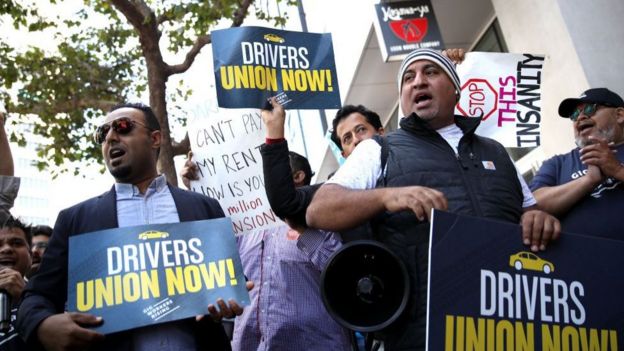By: Stephanie Seibert

Image source: https://www.bbc.com/news/technology-49670849
On September 11, 2019 California lawmakers passed employment legislation that would change “gig- companies” business models[1]. “Gig- companies” are businesses that offer a subset of jobs where entrepreneurs get work through an internet – based platform which matches them to customers seeking their service[2]. “Gig companies” include platforms such as Uber and Lyft[3].
Gig workers are not necessarily considered employees under federal and state employment law[4]. Since they are not classified as employees, they are classified as independent contractors[5]. Under the current labor standards, independent contractors do not qualify for protections such as The Fair Labor Standards Act or Americans with Disabilities Act[6]. Independent contractors also are not guaranteed other rights offered to employees, such as minimum wage, overtime pay, disability insurance, medical insurance, among much more[7].
The legislation passed in the California State Assembly intends to force gig-companies to reclassify independent contractors as employees. This legislation will require companies such as Uber and Lyft to completely restructure their business model[8].
The new legislation applies a strict “ABC test” to determine workers’ employment status:
(A) that the worker is free from the control and direction of the hirer in connection with the performance of the work, both under the contract for the performance of such work
(B) that the worker performs work that is outside the usual course of the hiring entity’s business
(C) that the worker is customarily engaged in an independently established trade, occupation, or business of the same nature as the work performed for the hiring entity[9]
In order for a worker to be considered an independent contractor, rather than an employee, the employer must prove that each element of the “ABC test” is satisfied[10].
Uber and Lyft are working together to try to exempt themselves from the bill, recognizing that this legislation could subdue their businesses[11]. Lyft said that if this legislation were to pass, drivers “may soon be required to drive specific shifts, stick to specific areas, and drive for only a single platform[12].” Uber is taking a more optimistic approach, arguing that the new legislation does not automatically reclassify drivers as employees[13]. Uber’s Chief Legal Officer stated, “[The legislation] does not provide drivers with benefits, nor does it give drivers the right to organize. In fact, the bill currently says nothing about ride-share drivers[14].” The ride-sharing platforms will argue that because workers can determine when they work, where they work and for how long, they are not under control or direction of their employers[15].
The ride-sharing companies are trying to propose alternative legislation in an effort to compromise. The proposed legislation would guarantee a minimum wage of $21/hr and allow for sectoral bargaining[16]. Sectoral collective bargaining allows workers in rideshare industry to band together in negotiations[17]. This is unlikely to persuade California legislation to change the already introduced legislation[18].
A large consequence of this legislation is that the riders that use the ride-sharing platforms are going to be the ones who bear most of the expenses[19]. Analysts predict that ride-sharing platforms will increase their rates in an effort to offset the costs associated with making their drivers employees[20]. The raise in price could increases as much as 30% per ride[21]. The legislation is still in its early stages and will take a while to be enacted. Consumers and workers should not expect to see enactment of the legislation until sometime next year[22]. However, California Gov. Newsom made it clear that he is expecting to sign legislation if it makes it to his desk[23].
[1] Gabrielle Canon, California’s controversial labor bill has passed the Senate. Experts forecast more worker rights, higher prices for services, USA Today (Sept. 11, 2019, 12:37 AM), https://www.usatoday.com/story/news/politics/2019/09/10/what-californias-ab-5-means-apps-like-uber-lyft/2278936001/.
[2] Jaclyn Kurin, A Third Way for Applying U.S. Labor Laws to the Online Gig Economy: Using the Franchise Business Model to Regulate Gig Workers, 12 J. Bus. & Tech. L. 193 (2017).
[3] Id.
[4] Emily C. Atmore, Killing the Goose That Laid the Golden Egg: Outdated Employment Laws Are Destroying the Gig Economy, 102 Minn. L. Rev. 887 (2017)
[5] Id.
[6] See Canon, supra note 1.
[7] See Id; Canon, supra 2 at 888
[8] Canon, supra note 1.
[9] Id.
[10] Id.
[11] Alejandro Lazo & Sebastian Herrera, Uber Vows to Fight California Legislation on Gig Economy, Wall Street Journal (Sept. 11, 2019, 7:36 PM), https://www.wsj.com/articles/california-governor-still-in-talks-with-uber-lyft-over-gig-workers-law-11568212014.
[12] Id.
[13] See Id.
[14] Id.
[15] Dave Lee, Uber says ‘gig economy’ law will not hurt business, BBC (Sept. 11, 2019), https://www.bbc.com/news/technology-49670849.
[16] Id.
[17] Id.
[18] Id.
[19] See Lazo, supra note 11.
[20] Id.
[21] Id.
[22] Cannon, supra note 1.
[23] Lazo, supra note 11.
